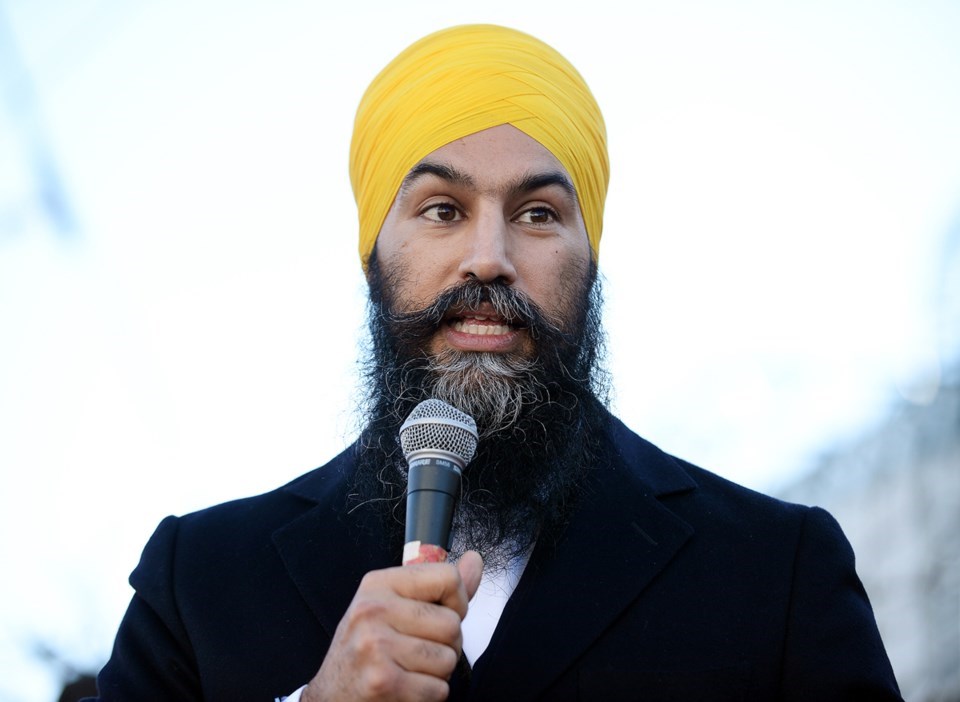Digital-savvy activists with national environmental charities were a driving force of Monday’s pro-Palestinian protests at federal constituency offices.
They used old-fashioned sit-ins to promote their campaign for a ceasefire in Gaza.
“What was new was the particular cause the protests were dedicated to, and the particular messages that were communicated,” said University of B.C. sociology professor David Tindall, who analyzes protest movements.
The protesters, who said they were with the Palestinian Youth Movement, targeted the offices of 17 members of Parliament across the country, including NDP leader Jagmeet Singh’s in Burnaby South and Liberal Joyce Murray’s in Vancouver Quadra.
The Trudeau Liberal government condemned the Oct. 7 Hamas terrorist attack, the worst massacre of Jews since the Holocaust, that resulted in 1,400 dead and 200 hostages. The government also supports Israel’s right to defend itself, but 33 Liberal, NDP and Green MPs signed an open letter last week calling for Trudeau to ask for a ceasefire.
At Singh’s office, co-organizer Atiya Jaffar, campaigns manager with 350 Canada, was joined by Harsha Walia, the former B.C. Civil Liberties Association executive director who praised Hamas’s tactics during an Oct. 9 rally in downtown Vancouver.
Jaffar did not respond for comment. Another 350 Canada employee, field organizer Emma Jackson, was involved in Edmonton.
Among those supporting them on social media were the Leadnow social campaign group and David Suzuki Institute campaigns director Anjali Appadurai. Appadurai unsuccessfully sought the B.C. NDP leadership last year and narrowly lost a bid for a seat in Parliament in 2021 with the NDP in Vancouver-Granville.
Nico Slobinsky, vice-president for the Pacific region of the Centre for Israel and Jewish Affairs, called Appadurai an apologist for Hamas in a post on X, formerly known as Twitter.
“If you really cared for the people of Gaza, you should demand that terror organization Hamas: Hands over food, fuel and medicine to Gaza’s civilians, immediately releases all hostages, stops firing terror rockets at Israel [and] unconditionally surrenders,” Slobinsky wrote.
David Suzuki Foundation (DSF) clean electricity campaigner Katie Rae Perfitt participated at the Ottawa-Vanier office of Mona Fortier.
Theresa Beer, spokeswoman for the Vancouver-based foundation, said Perfitt attended and participated “as an individual citizen, not on behalf of the DSF.”
“To the best of our knowledge,” Beer said, Perfitt was the only person from DSF involved in the protest.
“DSF does not have a public position on the conflict at this time,” she said, referring questions about Appadurai to the Institute.
Suzuki’s Salt Spring Island political advocacy arm did not respond by deadline. Likewise for 350 Canada and Stand.earth.
Stand.earth senior climate finance organizer Maya Menezes and senior digital campaigner Batul Gulamhusein were among those that Toronto Police removed from Finance Minister Chrystia Freeland’s Toronto office.
The sit-ins came two days after a rally outside the Vancouver Art Gallery where Langara College English instructor Natalie Knight gained international attention for calling Hamas’s Oct. 7 terrorist attack “amazing, brilliant.”
Knight had kept a low-profile since early 2020’s nationwide Shut Down Canada campaign. The American-led protests blocked transportation networks in support of the Wet'suwet'en hereditary chiefs and their opposition to the Coastal GasLink pipeline.
Langara College said Monday that Knight does not represent the college and the matter is now under investigation.
An article by University of Toronto assistant professor Chandni Desai, published in the May 2021 edition of the Journal of Palestinian Studies, said the Palestinian Youth Movement was among Shut Down Canada’s supporters.
“At around the same time that Indigenous nations were resisting this colonial encroachment within Canada, Palestinians were protesting the ‘Deal of the Century’ devised by the Trump administration as a Middle East peace plan,” Desai wrote.
Tindall said that progressive social movements are attracted to actors and causes they perceive as underdogs. Environmentalists are also increasingly interested in social justice, beyond the core issues like stopping clear-cut logging or protecting parkland.
However, while protesting for a ceasefire in Gaza, they could alienate supporters of their environmental activism.
“At the Ivy League universities in the U.S., you're seeing a lot of the donors with deep pockets, especially, that have some kind of connection to the Jewish community. They’re withdrawing some of their donations, or they're saying they're not going to donate to these institutions in the future,” Tindall said.
“Hypothetically, that's also a possible risk for some of these organizations [in Canada].”



